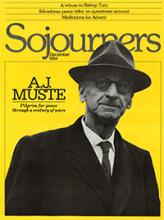Gospel Radicalism: The Hard Sayings of Jesus. By Thaddee Matura. Orbis Books, 1984.
If you want to get bothered again by Jesus' teachings, this scriptural study will surely do it. Thaddee Matura, a French Franciscan scholar of the New Testament, has spent much of his life dealing with the challenges of the gospel, trying to live them in community, and through his teaching gift trying to spread this unwelcome word to others.
Most of the book is just hard work—both because of the demanding and perhaps discouraging subject matter for most of us, and because it is largely done in the classic and somewhat dry manner of the professional exegete. He tries to be objective and true to the text and context, but the necessary result is a lot of slow reading with repetition, endless nuance and distinction, cross-referencing, and very faithful avoidance of editorial comment. The result is an excellent reference book or commentary on these texts of Jesus, a very helpful companion piece of Synoptic study, but a book that very likely could not hold your attention for light or even inspiring reading.
However, the very objectivity is what makes the book necessary and important in dealing with teachings that bring forth great subjectivity, fears, emotional responses, and volatile conversations. He expects this response as he states his purpose: "to make an inventory, to classify, analyze, and interpret exegetically the ethical teachings of Jesus bearing radical traits—that is, unusual, paradoxical, decisive, or absolute characteristics."
Radical for Matura refers to attitudes or deeds that diverge from the ordinary human or religious ways of acting. He believes, and I think conclusively proves, that Jesus is mandating and inviting the world—not just an elite—to a great deal of radicality, much of which has been singularly avoided or mystified by almost all of the churches.
Read the Full Article

